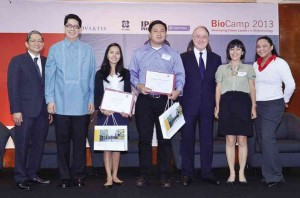
(FROM LEFT) Domingo, Montoya, Flores, Reyes, Alexander Jetzer of Novartis AG, Christine Fajardo of Novartis Healthcare Philippines and Arroyo
For some young scientists, discovering a drug to save the world from disease is not enough.
They believe a good business sense will help them make lives better.
“We need to find ways to make the medicine available to the people,” Malem Flores said.
The 2013 Novartis Biotechnology Leadership Camp (BioCamp) Philippine delegate said scientists needed pharmaceutical companies to help them transform their research into products for public consumption.
Flores, who is working with Filipino and American scientists on potential drugs and biofuels from indigenous marine mollusks, said she hoped to get tips on how to persuade biotechnology companies or investors to support their initiatives.
Fellow delegate Charles Jourdan Reyes started brushing up on his entrepreneurial skills by watching the reality show “Shark Tank,” where entrepreneurs present their inventions to investors, known as “sharks.”
The preparation helped Reyes, a magna cum laude graduate of Ateneo de Manila University with a degree in biology, minor in history, to secure a slot in the international BioCamp to be held from Aug. 25-29 on the Novartis campus in Basel, Switzerland.
Reyes and Flores were chosen the country’s representatives after the 10-hour local BioCamp at the Asian Institute of Management in Makati City.
Great candidates
Judging the five finalists, preselected from 51 applicants, was “difficult” because they were all great, Novartis Healthcare Philippines
Inc. chief scientific officer Francis Domingo said.
The two delegates were chosen by a board of judges composed of Domingo,
Dr. Jaime Montoya, executive director of the Department of Science and Technology’s Philippine Council for Health Research and Development; Joel Esguerra, Novartis’ Human Resources Department director; Virginia Aumentado, chief of the patent Information Analytics and Technology Monitoring Division; and Carmen Peralta, director of Intellectual Property Office Philippines.
Other finalists were Jan Vincent Arafiles, a cum laude graduate in biochemistry from the University of Santo Tomas (UST), who is working on a Master’s Degree in Molecular Biology and Biotechnology at the University of the Philippines (UP) in Diliman; Christopher Rey Dacanay, a summa cum laude graduate of the UST Faculty of Pharmacy and recipient of the 2013 Gold Medal Award for Academic Excellence of the Philippine Pharmacists Association; and Gerald Sanchez, a UP Manila magna cum laude graduate in biochemistry, who topped the Philippine Licensure Examination for chemists.
Aside from academic excellence and professional experience, Domingo said they also considered communication skills. Aspirants submitted research papers.
Reyes presented his undergraduate thesis on cyanobacteria as sources of novel antibiotics.
“We collected samples from the vast waters of the Philippines and cultured microorganisms called cyanobacteria… and extracted antibiotics,” said the 22-year-old, who is now taking up molecular biology and biotechnology at UP Diliman.
Flores, who is studying microbiology at UP Diliman and working as a research assistant at the Marine Environment and Resource Foundation of the UP Marine Science Institute, showed their research on the possibility of using marine mollusks’ bacteria in the development of antimicrobial, anticancer and antipain drugs.
Domingo said Flores and Reyes would join natural sciences and business graduate and postgraduate students from other countries in the international BioCamp.
Holistic view
“The objective is really to expose our [young] Filipino scientists… to a more holistic view of the scientific community and biotechnology,” Domingo said.
“They’ll be getting a new perspective outside of the laboratory and learning how to present a business case to potential investors,” he added.
For the local BioCamp, Novartis invited scientists and members of the academe to discuss wide-ranging topics, from research ethics and intellectual property rights to biotechnology or the use of living organisms to produce products and technologies.
There was also a workshop on how to create business pitches and strategies.
Four groups, each composed of eight graduate and postgraduate students, conceptualized products and business proposals, and tried to convince potential investor Karen Hipol of Hybridigm Consulting Inc., a consulting firm for biotechnology and commercialization firm in the Philippines, to “hypothetically” fund their research.
Maoi Arroyo, chief executive officer and founder of Hybridigm, told the students: “When two people of different fields work together, especially scientists and businessmen, it is not about making money but being able to do well by doing good, to make money while… helping other people.”
Arroyo said that with biotechnology, especially in health, “you are not selling… an iPad. You are helping somebody live a better life.”
Montoya said he hoped participants got a glimpse of how it was to be a “scientist bioentrepreneur.”
“I think it would be the best of both worlds to be a scientist, who is not just working in the confines of the four walls of the laboratory but… who reaches out to the community that it is supposed to serve,” he said.
Henson Lee Yu, 2012 international BioCamp delegate, said scientists tended to focus on “how things work” or “how a drug attacks the virus.”
But how the discovery, a cure for instance, reached communities and its impact should also be a concern, Yu said.
“We tend to stay in our own bubble… the ‘scientific bubble.’ We understand each other but laymen think we have a different language. It’s time to change and make a difference,” he added.